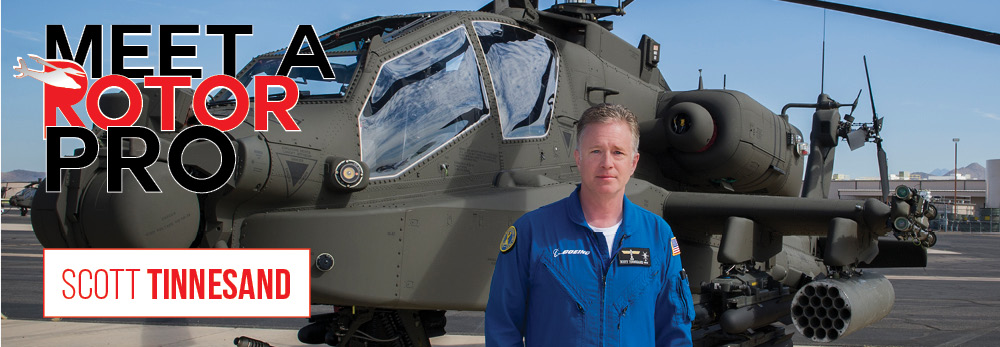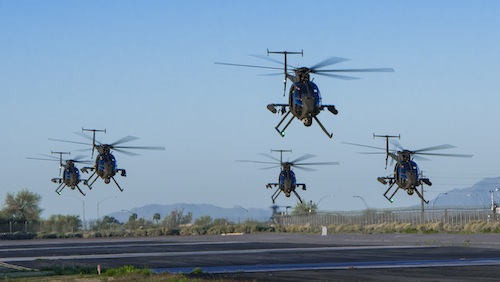|
May
22
2023
|
|
Posted 2 years 275 days ago ago by Admin
|
|

RPMN: What is your current position?
My dream job: experimental test pilot and instructor pilot for The Boeing Company in Mesa, Arizona. I primarily fly the AH-64E Apache and AH-6 Little Bird but I get to fly other helicopters and airplanes too, which provides lots of variety. The flight tests we conduct range from benign testing (new radios, software upgrades, etc.) to exciting experimental tests including weapons firing, testing new rotor blades and things of that nature. I work with a great group of pilots and support staff, which truly makes this my dream job. Besides, I do not know many civilian pilots that get to shoot miniguns off helicopters; I consider myself fortunate. On the side, I am also an FAA designated pilot examiner (DPE) in helicopters for private pilot through initial CFI certificates. Arizona’s great weather makes this area perfect for year-round flying so naturally there is a concentration of flight schools. The other FAA authorizations I have allow me to do special medical flight tests, military competency activities, foreign pilot license conversions and a few other things. I am active in local aviation organizations including being an FAA Safety Team representative, I am a co-chair for the annual HAI Heli-Expo Military to Civilian Transition Workshop and I work as an expert witness for aircraft accident lawsuits.
RPMN: Tell me about your first flight or experience with helicopters.
My first helicopter flight was on 15 June 1988 in an H300C at the University of North Dakota in Grand Forks. I had already earned my Private Pilot Airplane SEL certificate but was extremely excited and could not believe I was going to fly a helicopter! My instructor was George Hammond, an aviation great who flew bombers in WWII and fighters in Vietnam. It was a great experience and I remember it like it was yesterday.
RPMN: How did you get your start in helicopters?
After high school, I stayed in my hometown in Minnesota and attended community college while working at a paper mill. One day while looking at all the pamphlets on the wall for different colleges and transfer programs, I saw one for the aviation college at the University of North Dakota (UND) with a helicopter on the cover. I started making phone calls immediately and a short time later was enrolled for classes and I was awarded an academic scholarship through Army ROTC. The scholarship covered flight training so I was off and running as a helicopter pilot! At UND we had a small fleet of H300Cs and two beautiful H500Es.
RPMN: When and how did you choose to fly or work on helicopters? Or did they choose you?
During my flight training at UND I knew I wanted to fly helicopters forever. After graduation and commissioning in the Army, I was assigned to the Aviation Branch and began an 8-year stint on active duty as a helicopter pilot. By this point, it confirmed to me that aviation was my thing and I wanted it to be in helicopters.
RPMN: Where did you get your start flying or maintaining professionally?
Not counting Army military flying, my first civilian flying job was with a gyroplane manufacturer. Not only did I get my gyroplane commercial and CFI, but I got my start at flight testing, which turned out to be pivotal to how I got where I am today. I also was introduced to two mentors who played a huge role in my future. After this job, I started working helicopter air ambulance in Arizona and got my first taste of Part 135 work.
RPMN: If you were not in the helicopter industry, what else would you see yourself doing?
Like most pilots, I really cannot imagine doing anything else, but if I were not in the helicopter industry, I would certainly be flying airplanes probably as an airline pilot, but I would not be as happy as I am flying helicopters!

Tinnesand and fellow Boeing instructors depart Mesa for the Yuma Proving Grounds for aerial gunnery training with customer pilots
RPMN: What do you enjoy doing on your days off?
What is a day off?
RPMN: What is your greatest career accomplishment to date?
I never imagined that I would accomplish all the things that I have during my career, but I do know that I would not be where I am today without mentors in my life. I learned what it means to be a mentor and the power of networking, so I began mentoring others. For that reason, I would say my greatest accomplishment has been having the ability to mentor pilots and impact their lives and make as big a difference in their career trajectory as my mentors made in mine.
RPMN: Have you ever had an “Oh, crap” moment in helicopters? Can you summarize what happened?
My very first “Oh, crap” moment was kind of funny. Early in my helicopter training when auto rotations and throttle chops were introduced, my instructor would often give me a simulated engine failure with a throttle chop as soon as we were out of the airport’s airspace. He did this on occasion and I entered the auto and started calling out rotor RPM, airspeed, and trim. He announced, I have the controls. I said, “I got it under control” to which he replied, “The engine quit!” I happily transferred the controls to him and then realized that I had not been watching the engine RPM at all. My situational awareness was lacking, but it was a great lesson that I learned early in my helicopter flying career.
RPMN: If you could give only one piece of advice to a new helicopter pilot or mechanic, what would it be?
Find a mentor or two that can help you achieve your wildest dreams in our industry. You can certainly do it alone and still be successful, but it sure is a lot easier and more fun when you have someone working with you. I am a huge advocate of networking and mentoring is really another form of it. The power of networking (that usually starts with a mentor) is unbelievable. I am living proof of that.
RPMN: In your view, what is the greatest challenge for the helicopter industry at this moment in time?
I would have to say accidents. We have far too many bad things still happening even though every single organization is shouting “Safety First!” This does not apply to all accidents, but we still have pilots making bad decisions and taking unnecessary risks. It must stop.
READ MORE ROTOR PRO: https://justhelicopters.com/Magazine
WATCH ROTOR PRO YOUTUBE CHANNEL: https://buff.ly/3Md0T3y
You can also find us on
Instagram - https://www.instagram.com/rotorpro1
Facebook - https://www.facebook.com/rotorpro1
Twitter - https://twitter.com/justhelicopters
LinkedIn - https://www.linkedin.com/company/rotorpro1